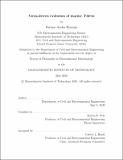Virus-driven evolution of marine Vibrio
Author(s)
Hussain, Fatima Aysha.
Download1192461170-MIT.pdf (25.91Mb)
Other Contributors
Massachusetts Institute of Technology. Department of Civil and Environmental Engineering.
Advisor
Martin F. Polz.
Terms of use
Metadata
Show full item recordAbstract
Microorganisms are the most numerous and diverse organisms on the planet and occupy virtually every known habitat. For these microbes, genotypic diversity is intimately linked to their ecology. As one of the main predators of bacteria, bacteriophages (phages) play an important ecological role in regulating the abundance and diversity of bacterial populations. Through highly specific predatory interactions, these bacteria-infecting viruses promote gene turnover in their hosts through frequency-dependent selection. As a result, phages are thought to be key drivers of the immense genetic diversity seen in microbial genomes. However, the impact of phages on bacterial diversification in the wild is poorly understood. This thesis examines virus-driven evolution of environmental microbes using bacteria of the Vibrio genus as a model. By isolating and sequencing the genomes of sympatric Vibrio strains and the viruses that infect them, we created a unique system to understand how viruses are impacting bacterial genomic evolution in nature. In the first study, we investigated the diversity and dynamics of lysogenic viruses, which integrate into the host genome as prophages, across Vibrio populations. By combining comparative genomics and lab-based inductions of lysogenic viruses from natural bacterial strains, we isolated numerous excisable prophages and mobile genetic elements, and found that transfer of prophages is more frequent among related hosts. In the second study, we investigated the evolution of resistance to viruses in bacteria at the resolution of clones. We found that viruses drive the rapid evolutionary turnover of novel phage-defense elements in bacteria, making them one of the strongest, if not the strongest, forces for near-term microbial evolution. Finally, we explored the abundance, diversity, and transfer dynamics of a particular set of lysogenic viruses, related to the newly-discovered Autolykiviridae, in Vibrio. Together, this work sheds light on the rapid diversification of microbial genomes attributed to viruses and provides an ecologically-grounded perspective on the implications and applications of virus- and microbe-based therapies for environmental and human use.
Description
Thesis: Ph. D. in Environmental Microbiology, Massachusetts Institute of Technology, Department of Civil and Environmental Engineering, May, 2020 Cataloged from the official PDF of thesis. Includes bibliographical references.
Date issued
2020Department
Massachusetts Institute of Technology. Department of Civil and Environmental EngineeringPublisher
Massachusetts Institute of Technology
Keywords
Civil and Environmental Engineering.